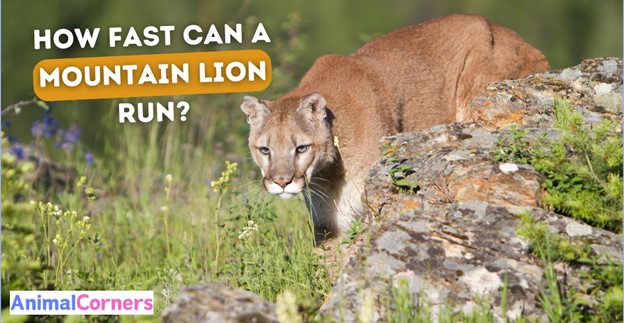How Fast Can a Mountain Lion Run

Did you have any idea that mountain lions, otherwise called cougars or jaguars, would be one of the quickest land creatures in North America? Visualize a creature as big as a mountain lion moving with fast speed!
In this blog post, we’ll explore How Fast Can a Mountain Lion Run. We’ll delve into their implausible speed competencies to discover the confidence behind their swift actions and what makes them such real hunters. So, buckle up and get ready to learn the charming world of mountain lion speed!
Understanding Mountain Lions
Mountain lions are huge, strong felines with brownish coats and solid bodies. They’re otherwise called cougars or jaguars.
These regal creatures inhabit various habitats, including forests, mountains, and deserts. With their keen sanities and stealthy actions, they’re well-adapted to thrive in varied environments.
Behavior of Mountain Lions:
Mountain lions are single trackers, liking to wander and chase alone. They’re very handy and can jump up to 20 feet in a solitary bound! Their hunting plans frequently include stealthily following their prey prior to starting a quick assault.
Despite their large size, mountain lions are controllers of camouflage, combining flawlessly with their surroundings. Their behaviors reflect their flexibility and prowess as apex marauders in their ecosystems.
Speed: How Fast Can They Run?
Average Speed:
Mountain lions are eminent for their overwhelming pace and flexibility, making them imposing hunters in nature. While their careful speed can change depending upon different variables, studies have demonstrated the way that they can arrive at velocities of up to 40 to 50 miles each hour in short bursts. Additionally, their typical speed through hunting or following exercises traditionally goes from 10 to 25 miles each hour. This range allows them to efficiently pursue prey while conserving energy for the final ambush.
Factors Affecting Speed:
Several factors can influence a mountain lion’s speed and agility:
- Terrain: The type of terrain can significantly impact a mountain lion’s speed. In open, level regions, they can accomplish higher velocities easily. In any case, exploring through rough landscapes, thick vegetation, or steep slants might dial them back.
- Prey Type: The size, agility, and behavior of the prey also play a crucial role. Mountain lions often target minor and more agile prey, such as deer or elk. Racing down faster prey may require them to exert more exertion and reach their maximum speed capabilities.
- Distance: The distance of the hunt can affect a mountain lion’s speed. While they can dash at high speeds for short distances, prolonged chases may lead to fatigue, causing them to slow down or recklessness the chase overall.
Understanding these variables gives significant bits of knowledge into how mountain lions adjust their speed and hunting systems to catch their prey in different conditions and circumstances.
Comparison with Other Animals
With regards to speed, mountain lions are great, yet they’re not by any means the only quick animals out there.
Let’s compare their speed with two other animals:
- Cheetahs: 1. Cheetahs are the quickest land creatures, fit for accomplishment velocities of up to 60 to 70 miles each hour in short bursts. Compared to mountain lions, cheetahs are unrivaled in sheer speed, making them the last runners of the set of all animals.
- Jaguars: Jaguars, local to the Americas, are known for their incredible form and hunting ability. They can run at velocities of up to 50 miles each hour, like mountain lions. In any case, panthers are additionally master bathers and climbers, permitting them to follow prey in different terrains, including thick wilderness conditions.
- Tigers: Tigers are the greatest cats on earth and live in various regions, including thick unsettled areas. While they aren’t as famous for their speed as cheetahs or even jaguars, tigers can, anyway, show up at paces of around 30 to 40 miles every hour while seeking after prey. Additionally, they frequently depend more on covertness and trap strategies instead of altogether speed through chases.
Understanding how mountain lions stack facing different creatures as far as speed assists us with valuing their one-of-a-kind capacities and variations as dominant hunters in their natural surroundings.
FAQs
How fast can a mountain lion run?
Mountain lions can reach speeds of up to 40 to 50 miles per hour in short bursts.
What factors affect a mountain lion’s speed?
Factors such as terrain, prey type, and distance can influence a mountain lion’s speed. Open, flat terrain allows for faster speeds, while rough terrain may slow them down. The size, agility, and behavior of the prey also play a role in determining their speed.
How does a mountain lion’s speed compare to other animals?
While mountain lions are amazing sprinters, they’re not generally so quick as cheetahs, which are the quickest land creatures. Mountain lions can likewise measure up to other wilderness hunters like panthers and pumas, each with its own exceptional speed and hunting systems.
Do mountain lions attack humans?
While mountain lion assaults on people are uncommon, they can happen, particularly in regions where human improvement infringes on their environments. Mountain lions commonly stay away from conflicts with people yet may assault assuming they feel compromised or cornered.
How fast can a lion run km?
Lions can run at speeds of as much as 80 kilometers consistently (around 50 miles consistently) in short explodes. This critical speed allows them to quickly pursue prey.
Can humans run faster than lions?
While people are gifted at running at decently high velocities, we by and large can’t beat lions over short spaces. Lions are a lot quicker runners and can basically overwhelm people in a pursuit.
Can lions run 50 mph?
Indeed, lions can run at rushes of up to 50 miles each hour (around 80 kilometers each hour) in short bursts. This incredible speed makes them troublesome pirates on the African savannah, permitting them to get prey with skill and precision.
Conclusion
So, what have we learned about mountain lion speed? We’ve uncovered that these grand pirates can arrive at velocities of up to 40 to 50 miles each hour in short explodes, making them troublesome trackers in nature. Factors like landscape, prey type, and distance can influence their speed, allowing them to adjust to various hunting circumstances.
As we wrap up, recollecting the significance of understanding and regarding wildlife is fundamental. Mountain lions assume a crucial part in keeping up with adjusted environments, and by studying them, we can all the more likely value their importance. We should endeavor to coincide calmly with these superb animals and save their living spaces for people in the future to appreciate.
By respecting and shielding normal life, we ensure a really encouraging future time for all living animals sharing our planet.





